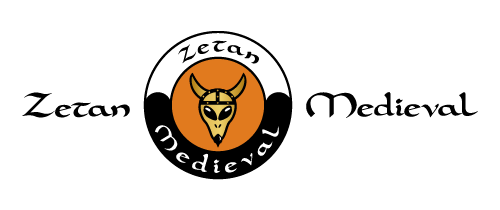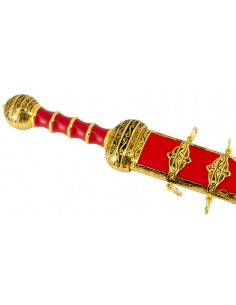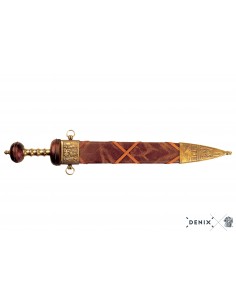Roman swords
€81.90
Spatha decorative Roman cavalry sword with nickel finishes on the pommel, guard and hilt, with a total size of 80 cm, steel blade 56 cm long and 3 mm thick. Includes black case with nickel details and stand. Its weight is 1840 gr.
€103.00
Spatha Roman decorative cavalry sword, with nickel finishes on the pommel, guard and hilt, With a total size of 80 cm and a steel blade 50 cm long and 3 mm thick with imitation damascus, Contains a black sheath lined with brown leatherette with nickel details and weighs 1670 gr.
€103.00
Decorative Roman cavalry sword Spatha, with antique gold finishes on the pommel, guard and hilt, With a total size of 80 cm, the blade is 50 cm long and 3 mm thick, made of imitation damascus steel, Contains sheath lined in red imitation leather with details in antique gold, its weight is 1670 gr,
€51.90
Set of two Gladius swords with sheath and straps to carry on the back. Total length 65.5 cm blade 47 cm.
€81.90
Roman sword with decorated sheath. Total measurement 81 cm sheet 56.5 cm.
€127.90
Spatha decorative Roman cavalry sword, with nickel finishes on the pommel, guard and hilt, It has a total size of 104.5 cm and a steel blade 76 cm long and 3.8 mm thick, Includes sheath with details of in nickel, its weight is 1877 gr.
€439.00
Gaius Julius Caesar (101 BC - 44 BC) was the best military and political head of state in ancient Rome. Acid engraved in gold and black. Damascene finish. Roman sword with stainless steel blade with engraved serial number.
€187.00
The Roman sword Julius Caesar, Mainz type, was used between the 2nd century BC. and the 1st A. D. This specially ornamented replica has a steel blade decorated with black details. The grip is made of carved wood.
€148.50
Sword of the legendary Julius Caesar, from the Roman era of the 1st century BC
€148.62
Sword of the legendary Julius Caesar, from the Roman era of the 1st century BC
€148.20
Gladiator sword from the Roman era special collectors of the Denix firm. It measures 73 cm and weighs 1985 gr.
€286.00
This Gladius sword has a blade of forged high carbon steel and tempered by hand, a sword worthy of an elite Roman officer. All the ornaments are very detailed and meticulously finished by hand in firm metal. All the pieces have been aged to give them the same appearance and the same appearance as a sword used in a Roman campaign.
He wears a baldric...
€275.00
This beautiful Roman gladius has a blade of high carbon steel forged and tempered by hand; It is truly worthy of a Roman officer. All the aged pieces have a meticulous handmade finish in solid wood with metal details that complete this real piece.
He wears a baldric with a personalized wooden shell wrapped in leather and accented with metal details....
€242.00
Functional Gladius with ivory imitation grip and high carbon steel blade. Includes wooden scabbard covered in leather with brass decorations.
€187.00
Pompeii functional sword with high carbon steel 1065 blade and wooden hilt. Scabbard in wood covered with metal and leather.
€99.00
Functional Roman pugio made of carbon steel 1055. Wood hilt. Includes a wood scabbard covered in leather with brass parts.
€168.57
Roman Gladiator sword with scabbard. Length 80 cm. Stainless steel blade.
€77.58
Gladius Roman sword with sheath and chain for hanging, made of steel. Total length 80 cm, blade 55 cm, blade width 5.3 cm
€127.56
Julius Caesar sword decorated in gold. Length 80 cm. Stainless steel blade. Scabbard not included
€127.56
Roman Gladiator sword. Length 80 cm. Stainless steel blade.
€173.00
Julio Cesar sword with scabbard, decorated in gold. Length 80 cm. Stainless steel blade.
€164.96
Spatha, sword of Roman double-edged cavalry. The blade is made of EN45 steel, is not sharp, and has a length of 64 cm. The leather lined sheath is included. Total length: 81.5 cm.
€65.98
Gladiator roman net made of jute yarn of 4 mm. The measurement is 1,3 square meters. The "retiarius" was a gladiator who fought with a ballast net, a trident with three points and a dagger (pugio)
€659.96
This authentic replica of a Roman Aquila exhibits a large, impressive eagle made of massive brass. The eagle was crafted with such great attention to detail that even the feather structure is clearly visible. It alone weights over 4.4 kg and is an absolute must-have for any historically accurate Roman legionary re-enactment. Besides, this standard...














































